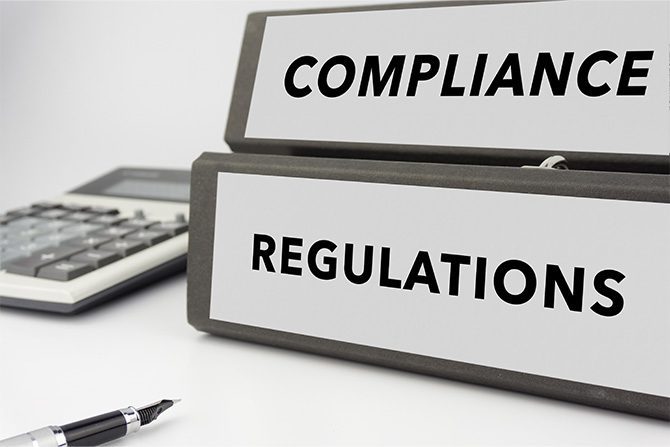
Transportation compliance is a critical aspect of the logistics industry, particularly when it comes to cross-border freight transportation. Adhering to transportation regulations and requirements is essential for ensuring the smooth movement of goods across borders while maintaining safety, efficiency, and legal compliance. In this article, we will delve into the concept of transportation compliance, its importance in cross-border freight, and how businesses can navigate the complexities to achieve successful and compliant operations.

Transportation compliance is a critical aspect of the logistics industry, particularly when it comes to cross-border freight transportation.
Understanding Transportation Compliance
Transportation compliance encompasses a set of rules, regulations, and standards that govern the transportation of goods. It involves adherence to both domestic and international laws, industry-specific regulations, and safety guidelines. Compliance requirements may include licensing and permits, documentation, vehicle and equipment standards, driver qualifications, weight and dimension restrictions, hazardous materials handling, and customs procedures.
At the same time, we must not neglect the trade compliance that goes hand in hand with transportation. It involves ensuring that businesses and individuals comply with legal requirements and standards related to imports, exports, customs procedures, and trade agreements. Trade compliance aims to promote fair trade practices, prevent fraud, protect national security, ensure public safety, and maintain the integrity of global supply chains.
The Significance of Compliance in Cross-Border Freight Transportation
Cross-border freight transportation involves the movement of goods between different countries, which brings additional compliance challenges. Compliance ensures the legality of international shipments, protects the integrity of the supply chain, and prevents disruptions due to non-compliance penalties or border delays. It also promotes safety by ensuring proper handling of hazardous materials and adherence to transportation security protocols.
Critical Aspects of Transportation Compliance in Cross-Border Freight Transportation
- Documentation and Customs: Proper documentation, including commercial invoices, packing lists, and customs declarations, is crucial for compliance. Understanding and fulfilling customs requirements, such as import/export licenses and duty/tax obligations, is essential.
- Regulatory Compliance: Adhering to transportation regulations specific to each country is vital. This includes driver qualifications, vehicle permits, weight restrictions, and compliance with international agreements like the International Commercial Terms (Incoterms).
- Safety and Security: Compliance with safety standards, such as driver hours-of-service regulations, vehicle maintenance, and cargo securement, ensures the safety of the transportation process. Additionally, complying with security measures, such as Customs-Trade Partnership Against Terrorism (C-TPAT) and Authorized Economic Operator (AEO) programs, enhances supply chain security.
- Risk Management: Effective compliance involves identifying and managing potential risks associated with cross-border transportation, such as border delays, trade restrictions, and regulatory changes. Implementing risk management strategies ensures proactive mitigation and contingency planning.

Regulatory bodies regularly update regulations, so it is essential to monitor any changes that may impact your organization.
Navigating Transportation Compliance
To navigate transportation compliance in cross-border freight transportation successfully, businesses can follow these best practices:
- Stay updated: Continuously monitor changes in transportation regulations and requirements, both domestically and internationally.
- Collaborate with experts: Seek guidance from logistics partners, customs brokers, and legal professionals with expertise in cross-border transportation compliance.
- Invest in technology: Utilize transportation management systems (TMS) and customs compliance software to automate processes, ensure accuracy, and streamline compliance procedures.
- Educate and train staff: Conduct regular training programs to educate employees on transportation compliance requirements and best practices.

Partnering with experienced logistics providers can streamline supply chain management processes.
Final consideration
It’s not just an issue of safeguarding one’s business associates, clients, and nation when it comes to understanding trade and logistics compliance standards. Additionally, it is blatantly self-serving. Even when the business environment changes, a strong compliance program safeguards profitability and retains a sense of adaptability.
Transportation compliance is crucial for the smooth and legal movement of goods across borders in cross-border freight transportation. By understanding the intricacies of compliance regulations, businesses can navigate the complexities and ensure successful operations. Embrace the importance of transportation compliance, stay informed, collaborate with experts, leverage technology, and invest in staff education to achieve compliance excellence and streamline cross-border freight transportation. Businesses can enhance efficiency, mitigate risks, and maintain a strong and compliant supply chain.
Compliance cannot be an afterthought in the global supply chain; it is a continuous effort that calls for thinking, and fresh ideas. Your personal compliance program ought to be off to a good start after these fundamentals have been taken into consideration.
If you are looking for an expert hand to make your cross-border shipping easier, you can always count on ILS’ first-class services.


